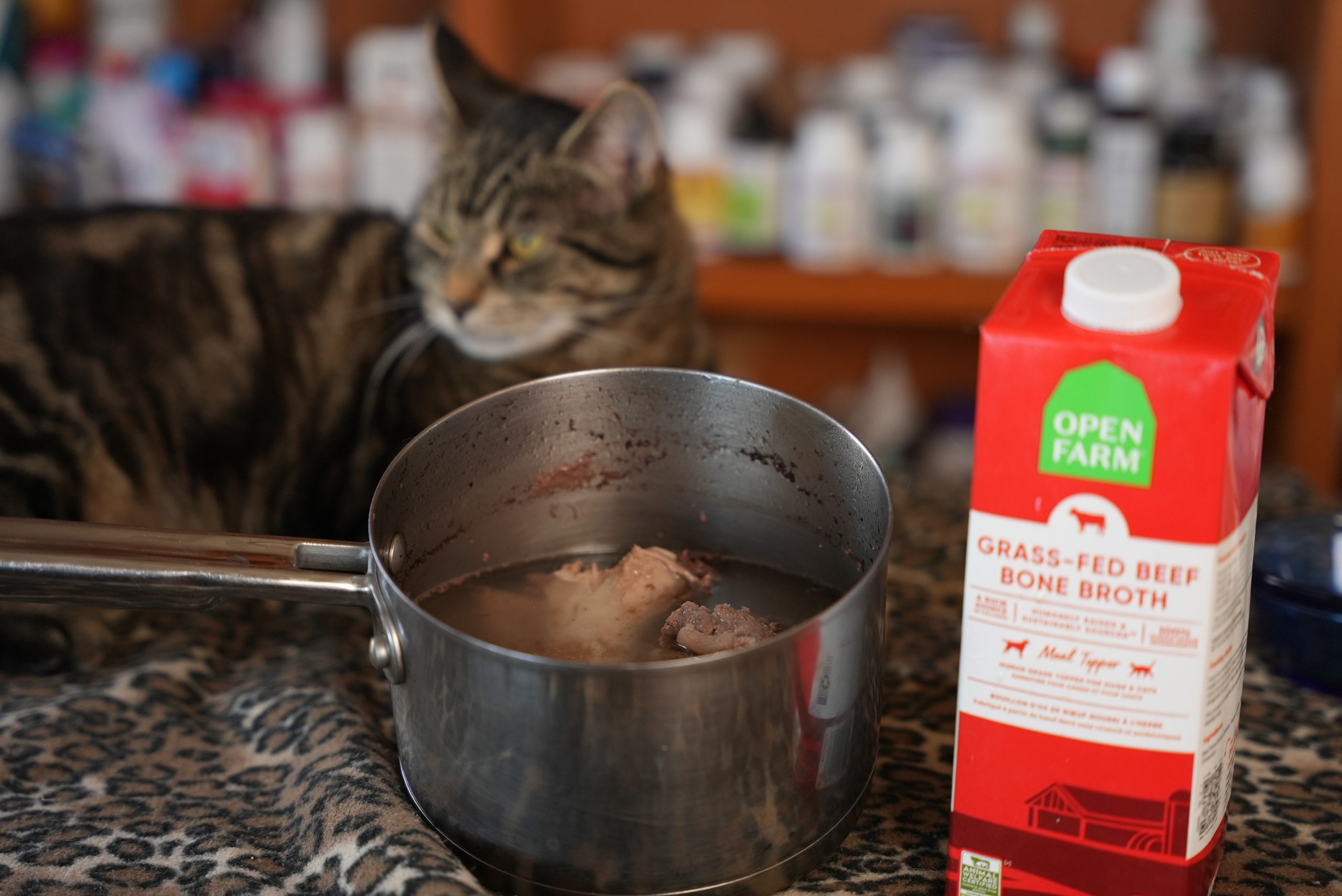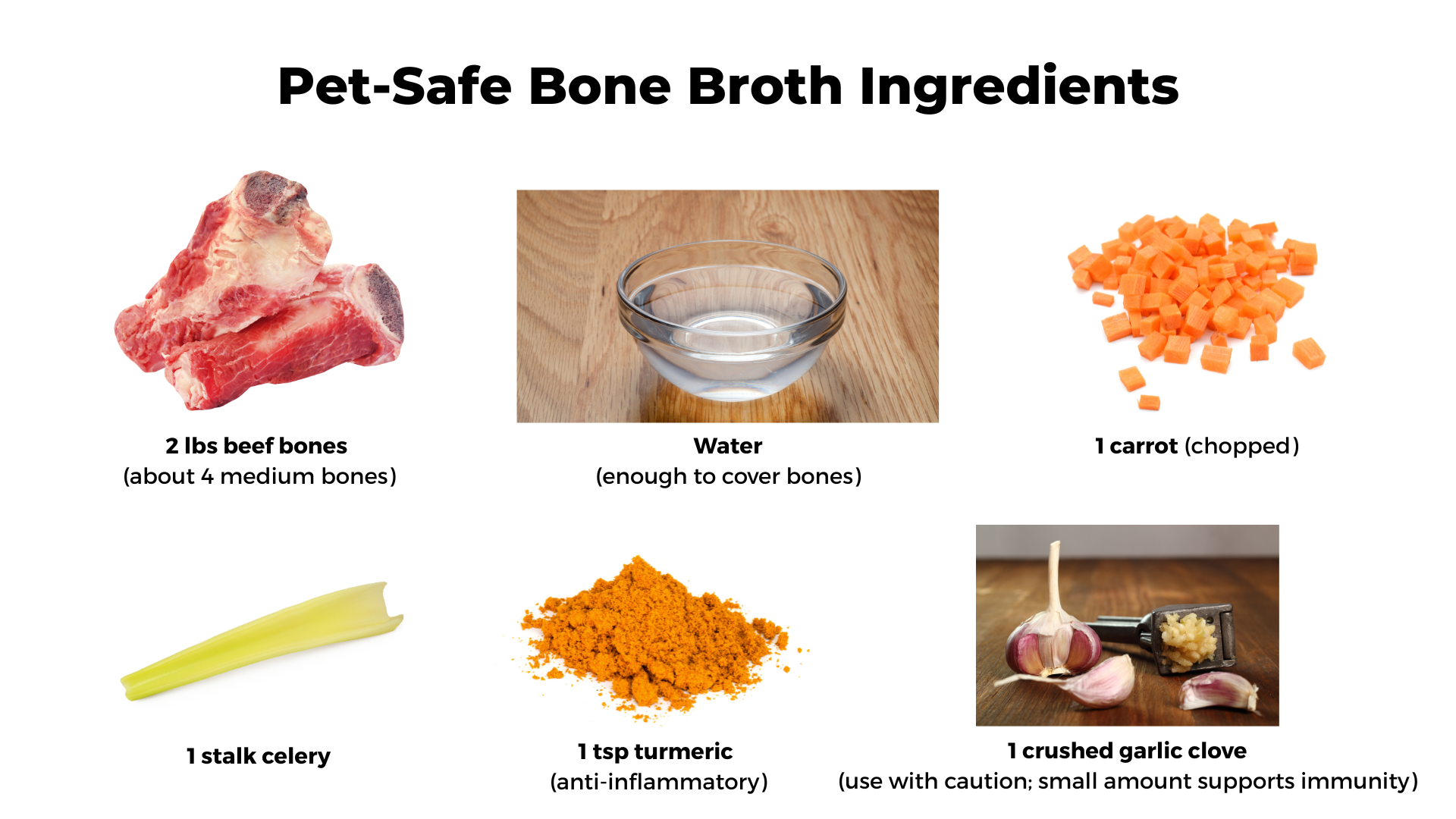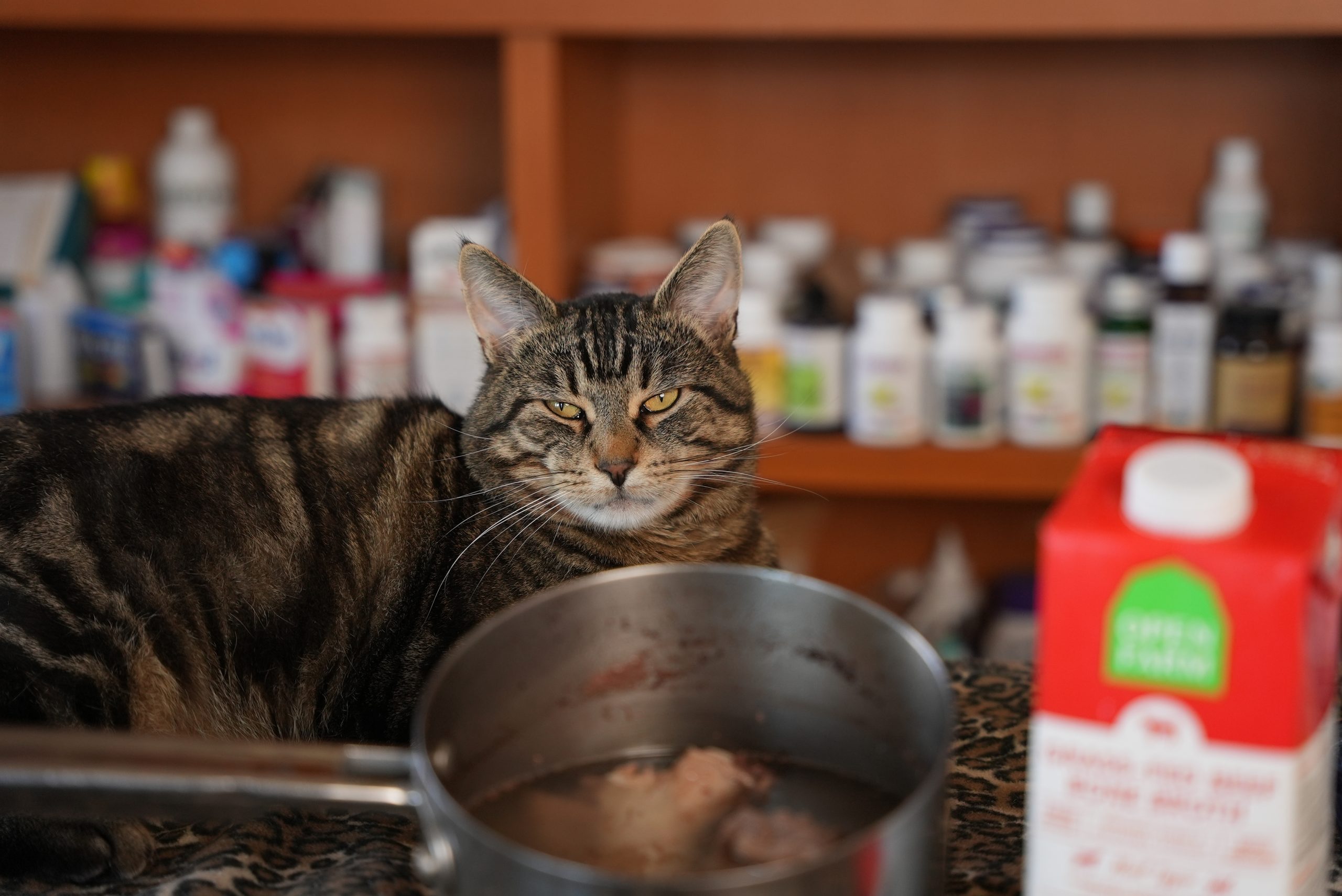Homemade Bone Broth for Dogs: A Simple Recipe for Better Health
![]()
Why Choose Dr. Jones’ Ultimate Canine Health Formula for Your Dog?
Dr. Jones’ Ultimate Canine Health Formula is the ideal choice for pet owners who want to support their dog’s overall health and well-being. This comprehensive, all-natural formula promotes a variety of key benefits that will enhance your dog’s quality of life. It supports mobility and joint comfort, ensuring your dog can move freely and comfortably, whether climbing stairs or hopping into the car. The formula also boosts vitality and energy levels, helping your dog stay active and playful.

Why Choose Dr. Jones’ Ultimate Feline for Your Cat?
Dr. Jones’ Ultimate Feline is specially designed to support your cat’s overall health, ensuring they live a long, happy, and active life. This holistic formula works in several ways to improve your cat’s well-being. It alleviates recurrent episodes of diarrhea and vomiting, supports digestive health, and promotes healthy mobility and joint function, especially important for aging cats. This formula offers safe, supportive care, helping to manage aging symptoms. Dr. Jones’ Ultimate Feline is a must-have for your cat’s long-term health and happiness.


Bone Broth for Dogs and Cats: Health Boost or Hype?
Bone broth has gained popularity recently, touted as a nutritious supplement to your pet’s diet. While it does have many potential benefits, it’s important to ask—does it truly live up to the hype? As a pet owner, it’s natural to want the best for your furry friends, so let’s break down what bone broth can do for them, its potential drawbacks, and how you can make it safely at home.
Why Bone Broth is Beneficial for Pets
Bone broth is not just a tasty addition to your pet’s meals—it’s packed with nutrients that support joint health, gut function, immune system strength, and even skin and coat health. Here’s a closer look:
-
Supports Joint Health
Bone broth contains glucosamine, chondroitin, collagen, and hyaluronic acid—key components that help maintain healthy cartilage, ligaments, and tendons. These nutrients can help your dog or cat with joint issues, including arthritis and tendon injuries, by rebuilding lost cartilage and strengthening their ligaments. -
Aids Gut Health
The gelatin, glycine, and glutamine found in bone broth can be incredibly beneficial for gut health. These amino acids are known for their ability to soothe and repair the digestive tract, which is especially helpful for pets dealing with chronic gastrointestinal issues like diarrhea or inflammatory bowel disease. -
Boosts the Immune System
Bone broth is rich in amino acids like glycine, glutamine, and proline, which play a crucial role in supporting your pet’s immune system. These nutrients help maintain overall body health and can even assist with quicker healing if your pet is recovering from an illness or injury. -
Improves Skin, Coat, and Hydration
Collagen, the most abundant protein in the body, is found in bone broth. Since the skin is the largest organ, giving your pet the building blocks for better skin health can improve hydration, reduce skin inflammation, and potentially help with chronic skin conditions like allergies. -
Versatile Meal Topper
Bone broth can be added to your pet’s regular meals or served frozen in ice cubes for a fun and hydrating treat. It’s an easy way to enhance the flavor and nutrition of their food.
Recommended Dosage
For pets, I recommend serving 1–2 tablespoons of bone broth per 10 lbs of body weight daily. This small addition to their diet can offer big benefits without overloading their system.
The Downsides of Bone Broth
Despite its benefits, bone broth isn’t without its downsides. Here’s what you need to be aware of:
-
Limited Scientific Research
While there’s a lot of anecdotal evidence from pet owners who swear by bone broth, there are few scientific studies that specifically confirm its benefits for pets. This means it’s still not fully proven, even though it has potential. -
Risk of Unsafe Ingredients
Many commercially available bone broths contain ingredients like onion, or excess salt—all of which can be harmful to pets. Always double-check the ingredients or, better yet, make your own at home to ensure it’s safe. -
High Fat Content
Bone broth can be fatty, and if not prepared correctly (skimming the fat layer), it could lead to health issues like pancreatitis in dogs and cats. Always ensure that you remove any excess fat before serving it to your pet. -
Short Shelf Life
Homemade bone broth should be refrigerated and consumed within a few days. Commercial varieties have a short shelf life too, typically lasting only up to seven days after opening. Freezing the broth in ice cube trays can help prolong its shelf life for a few months. -
Not a Complete Meal
Bone broth should be seen as a supplement, not a replacement for your pet’s regular meals. While it adds extra nutrients, it doesn’t provide all the essential proteins and vitamins your pet needs to stay healthy.
How to Make Safe Bone Broth for Pets

Making bone broth at home is easier than you might think! Here’s a simple recipe to get you started:
Ingredients:
-
2 lbs beef bones (about 4 medium bones)
-
Water (enough to cover the bones)
-
1 carrot, chopped
-
1 stalk celery
-
1 tsp turmeric (anti-inflammatory)
-
Optional: 1 crushed garlic clove
Instructions:
-
Simmer the Bones: Place the beef bones in a pot and cover with water. Simmer for 12 to 24 hours. This slow simmer will help extract the nutrients from the bones and connective tissues.
-
Add Vegetables: After a few hours, add the chopped carrots, celery, garlic and turmeric to the pot. Continue simmering for the remaining time.
-
Cool and Strain: Once the broth is ready, allow it to cool overnight. Strain out the solids and skim off the fat layer from the top.
-
Serve or Freeze: You can serve the broth immediately or freeze it in ice cube trays for future use.
Important Notes:
-
Avoid Harmful Ingredients: Never use onions or excess salt in your broth.
-
Commercial Options: If you prefer buying bone broth, make sure it’s specifically made for pets. Always check the label for any harmful ingredients.
Conclusion
Bone broth can be a great addition to your pet’s diet, offering support for joint health, gut health, and immune function. But as with anything, moderation and proper preparation are key. Always ensure the broth is made correctly, free from harmful additives, and used as a supplement rather than a full meal replacement. If done right, your pet can enjoy the many health benefits bone broth has to offer. If you try it, I’d love to hear how your pet responds—did it help with their joints, digestion, or overall health? Let me know in the comments!

Thanks for reading, and don’t forget to subscribe for more natural pet health tips!















I watched your you tube of using diaiatacus earth for fleas in cats and dogs. And also a recipe with DE for worming. can the recipe for worming be used for new pups and at what age please. I really love watching your u-tubes and that you have left allopathic for holistic. I also give homeopathic nosodes for dhlpp & heart worm. at what age can I start the new pups on the nosodes? My holistic veterinarian passed so I can’t ask him. thank you so much. and for sharing all this great information to all !!!!
Yes, you can use the diatomaceous earth (DE) worming recipe for new puppies. Start at 3–4 weeks of age, administering 1/4 teaspoon of food-grade DE mixed with their food, once daily for 3–4 weeks. Always consult your veterinarian before starting any new treatment
Regarding homeopathic nosodes, they can be given to puppies as early as 3 weeks old. For parvo and distemper, administer 1 dose daily for 3 days, then 1 dose weekly for 4 weeks, and 1 dose monthly thereafter until about 1 year old. For rabies, give 1 dose daily for 3 days before vaccination, and 1 dose after vaccination.
Why do you include garlic in your bone broth recipe? I was told garlic is toxic to dogs.
Garlic is safe for pets in low dosages. Check these related articles:
https://veterinarysecrets.com/?s=garlic
May I can homemade bone broth?
Yes — homemade bone broth is beneficial for pets. It provides collagen, minerals, and supports gut health.
Is bone meal powder an acceptable substitute for bone powder?
Thank you.
Yes